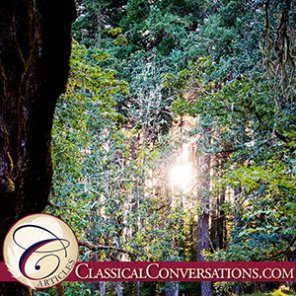Our 2017 Parent Practicum speaker probably thought I was taking diligent notes. Certainly, I was scribbling furiously as he spoke of doxology and of angels continuously awed into reverent exclamation. Holy, holy, holy! Perhaps he would have been more flattered even, to know that I was penning song lyrics. The ideas were too big and too wondrous not to pour over into art.
I have often lamented with other artistic parents that though inspiration may strike while soaking in the beauty of creation, by the time everyone is hustled into the house, fed, wiped up, diapered, provided with books, and shuttled into naps, it is usually well sapped. Heedless of the studio, we resort to cookies and coffee on the couch.
Yet inspiration flooded me again two weeks later as I was driving across the country, marking the miles with podcast after sermon after podcast, and I found that increasingly, the discussions of big ideas in classical education and sacred ideas in Biblical exegesis found a nexus. The discussions of transformation through literature, of precision in reading and writing, and of the pursuit of beauty and truth wove together these sources; how evident that true education is simultaneously as quotidian as times tables and as rarified as spiritual sanctification.
This time I was penning frantic notes on my right leg, eyes on the interstate. Those notes became two essays, including this one, and a lot of additions to my summer reading list. A familiar pattern emerged again: I write and compose after listening.
Here too, is the trivium at work. The synthesizing of known grammar into rambling ideas happens as I listen and mentally dialogue with the speakers. The beauty of understanding that comes from a dialectic experience must spill out into rhetorical expression. There is a natural desire to take the ideas and master them fully by encompassing them in a fitting form.
In the progressive classrooms in which most of us grew up, we were asked to create ex nihilo in kindergarten and to memorize swaths of information in high school, inverting the natural course of learning. In Classical Conversations, we set things back upright. It is the Challenge students who, having accumulated factual knowledge in Foundations and Essentials, now dialogue together until their ideas percolate and bubble over into creative processes of reasoned speech and writing.
The trivium reminds us that we are only image bearers. We study the creation and its Maker and we are moved to imitate. Our inventions are just new arrangements of God’s media, a worshipful reaction to the goodness of creation. We are compelled with the angels to repeat holy, holy, holy with pen and brush.
How beautiful, then, to wend our way down these well-trod trails with our children as we homeschool. What shape and purpose it gives to our days. Our grammar memory work, our eager dialectic discoveries, and our best rhetorical products—what we call mastery—are paths with converging end points. They lead to knowledge of our Creator, who calls wonders up from nothing.




